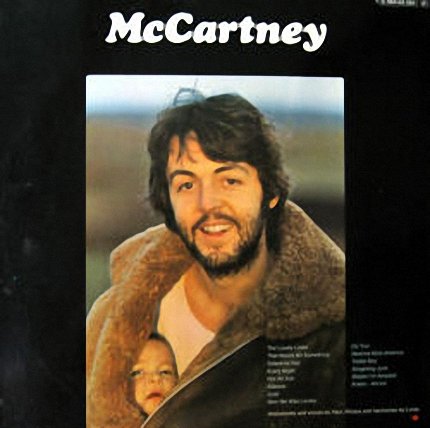Thursday, April 16, 2015
The Quiet Brilliance Of Paul McCartney's First Solo Albums
Paul McCartney has long been thoroughly misunderstood by casual music fans. He is usually thought of as the nice, cheerful Beatle capable of writing a great pop song but unwilling to experiment and push the envelope like his writing partner John Lennon. Furthermore, McCartney's solo records are usually considered fluff, plenty catchy and all, but totally lacking in serious intent.
To reduce McCartney to "Silly Love Songs" does him a huge disservice. In the first place, his behavior in the later years of the Beatles was not so nice and cheerful. Yoko Ono did not break up the Beatles, McCartney's attempt to take over the band after manager Brian Epstein's suicide alienated his mates to the point that Lennon quit and the others essentially took his side. It is telling that on their early solo records the Beatles play on each others' albums, but nobody plays on Paul's.
Those first two records, McCartney and Ram, are also more musically daring than what his bandmates were doing, contrary to stereotype. Don't get me wrong, Plastic Ono Band, Imagine, and All Things Must Pass are all fantastic albums, and are as good as or better as Paul's output in the period. In the period from 1970 to 1971, Paul McCartney basically invented lo-fi indie pop about twenty years before it became a thing. He was willing to throw experiments and spontaneous stuff on records fearlessly, and for that reason both albums have a warm, homey feel to them.
McCartney announces its intentions with its beautiful, artsy, off putting cover. Despite naming the album after himself, he does not appear on the front. The picture on the back is a famous and endearing photo of him sheltering his daughter in his coat while sporting a lazy beard. The front lets the listener know that this will not be a straightforward pop album, and the back signals that the man behind it is taking shelter in domesticity. Both principles come out in the first track, "The Lovely Linda," evidently recorded on a lark while Paul was testing the rather limited equipment he used to record the album. Make no mistake, McCartney isn't just reveling in domestic life. The stark "Every Night" describes deep depression better than just about any other song. He describes wanting to go out every night and get wasted to forget then not wanting wake up the next day. It also expresses longing for Linda, who evidently endured a lot in this period of time. This is not a silly love song, but a look into the dark night of the soul.
Other tracks sound unpolished, even unfinished. "Momma Miss America" is missing lyrics, but has an amazing dark mood about it, like the soundtrack to an assassin heading out at midnight to do a dirty deed. The song shows off both McCartney's drumming and guitar playing, since he recorded all of the instrumental tracks himself. While his first solo album closes out with "Maybe I'm Amazed," a very Beatle-y love ballad, it's almost there to provide some of that old time religion for listeners who might feel lost at sea.
1971's Ram steered towards brighter shores, but maintained the same off the cuff, spontaneous feel. It was credited to Paul and Linda McCartney, a fact that others saw as a dig at John and Yoko, but which I interpret as a tribute to how Linda had helped pull Paul back from the edge. The first song, "Too Many People," seems a direct response to his detractors, especially Lennon, with the lines "You took your lucky break/ and broke it in two." It also rocks pretty damn hard, opening up in ways that the first album never quite did. Some experimental touches persist, like the hypnotic "Ram On."
Once McCartney get the acrimony of the Beatle breakup out of the system he crafts some beautiful, symphonic pop songs that could have been put on Abbey Road. "Uncle Albert/Admiral Halsey" may be way over in the realm of frivolity that so frustrates his fans, but it is still gorgeous and supremely catchy. The last song, "Back Seat of My Car" is just flat out amazing, and deserves to be much more well known than it is. The 50s touches, the symphonic strings, impassioned singing and searing guitar are quite a combination. The sheer complexity of it is really stunning, and in that respect it far surpasses what his former bandmates were up to. You can call his music in this period frivolous, but certainly not uninteresting. Forty-five years on it's easier to see the brilliance, removed as we are from the hothouse world of the early 1970s and expectations it brought to each new Beatle solo album. Now it's free to just be good music, and for that I am grateful.


Could not agree more, both LPs are some of my faves from the 70's that I bought as soon as they came out. I was SO PISSED when Wings eventually became his persona, that was a band that I simply did not like, but no matter.
ReplyDeletehttp://www.heydullblog.com
ReplyDelete